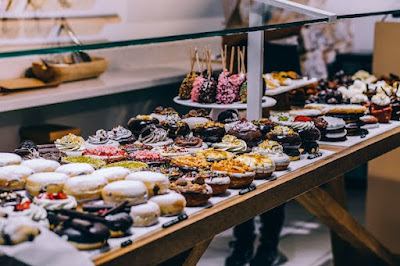Do I need a license to sell homemade food in Florida
Do I need a license to sell homemade food in Florida
The Cottage Laws of Florida prohibit the sale of food without a permit.
cottage-law-permit
If you have discovered that you are skilled in manufacturing or baking something nice and people have told you that they would be willing to pay for it, you may want to consider launching your own small business.
Do I need a license to sell homemade food in Florida
You are going to need the appropriate licenses and permits in order to sell the majority of food products. However, people are able to circumvent these regulations thanks to Florida's cottage laws.
Get familiar with the fundamentals of the Florida food businesses that do not require permits.
What are "Cabin Foods"?
Cottage foods are a select set of handcrafted foods that can lawfully be sold directly to consumers who know what they are buying. They are exempt from having to obtain licenses from or be inspected by the Florida Department of Agriculture and Consumer Services (FDACS). These meals are less likely to make you sick than others, the majority of the time.
How to Begin a Homemade Food Business in the Sunshine State of Florida
Do I need a license to sell homemade food in Florida
In order to get a head start on figuring out how to start a cottage food business in Florida, the first thing you need to do is learn what kinds of foods you are allowed to sell without a proper authorization. There are a lot of lists that demonstrate which food establishments in Florida do not need permits. You are headed in the correct direction if the product you want to develop falls into one of these categories and you want to create it.
If you know about Florida's cottage rules, you can build a sound business plan and set reasonable targets for growth.
Do I need a license to sell homemade food in Florida
People in Florida who sell food but do not require permission to do so.
A few number of foods and food items are authorized to be prepared and sold in the state of Florida. One of the most significant aspects that decides what may and cannot be sold is whether or not a product requires being stored at a particular temperature.
The following are examples of products that are acceptable to sell:
Bread loaf, buns, and cookies;
Cookies, cakes, and other types of baked goods;
Candies and various different types of sweets;
Honey that was produced with manual labor;
preserves in the form of jellies, jams, and other condiments;
Fruit pies with dried fruits;
Dried herbs and spices, as well as mixtures;
Homemade pasta;
Cereals, trail mixes, and granola;
Toasted or untoasted nuts, with or without coating;
Vinegar and flavored vinegars; and
Popcorn and balls that are formed from popcorn.
Do I need a license to sell homemade food in Florida
Homegrown produce is used in the production of a significant number of these goods. This gives farmers an extra opportunity to make money and an outlet for their creativity. However, Florida cottage food vendors are not required to utilize ingredients that they themselves cultivated and harvested.
Florida Cottage Laws
The majority of Florida's cottage regulations concern the manner in which and the locations in which goods can be marketed. The guidelines for these statutes can be found in Section 500.80 of the Florida Statutes. However, keep in mind that the laws and regulations that govern other states and localities may be different from those that govern Florida.
Do I need a license to sell homemade food in Florida
Organizing a sale in the state of Florida
It is illegal for anyone outside the state of Florida to sell meals that were prepared in a home kitchen. Once the products have crossed state boundaries in the course of their sale, they are required to comply with the cottage laws of other states, which may or may not permit sales of a similar nature.
Maximum Sales
According to the rules in effect in Florida, the total yearly gross sales of cottage foods cannot exceed the amount of $50,000. Sales are taxed income.
Making food on local, family-owned farms
Your primary residence's kitchen is the only place where you can legally prepare and package food for resale. You won't be successful in a summer home, a motor home, a vacation home, or in the great outdoors.
E-Commerce Sales
A lot of individuals browse for and buy products online. The proprietors of cottage food enterprises have the ability to offer their wares online; however, customers must pick them up in person. This is a concern not only for intrastate commerce but also for commerce between countries.
Private Events
Cupcakes, wedding cakes, and birthday cookies are all fantastic examples of regular cottage meals that can be produced for a particular occasion. The consumer must accept delivery of the cottage food either directly to their home or to the location of a private event that the customer is hosting.
Not a Single Retailer
It is against the law in the state of Florida to stock foods produced in cottage industries at retail establishments. Wholesale products have to meet some extra restrictions.
Local rules
When it comes to preparing, processing, storing, and selling cottage food items, a cottage food firm is required to comply with all applicable county and city rules and ordinances. There is a possibility that these are distinct from Florida's cottage laws in general.
Do I need a license to sell homemade food in Florida
The Florida Cottage Food Act's Requirements for Product Labeling
For the sake of the safety of the consumer, cottage foods have to be packaged and labeled correctly. In addition to this, they are required to include the following statement: "Made in a cottage food operation that is exempt from Florida's food safety requirements."
Cottage food goods that have previously been packaged are the only ones that can be sold by a cottage food business. On the label, the following information must be displayed in English:
Name and address of the establishment that specializes in home-cooked food;
The name of the dish that was prepared at home;
The product's constituents, listed in the order of those that contribute the most to the total weight;
Do I need a license to sell homemade food in Florida
How much the item weighs, as well as how much room it takes up;
Information regarding allergies, as mandated by rules governing the labeling of products sold in the United States; and
the correct nutritional information, as mandated by legislation governing labeling on a federal level.
The proprietors of cottage food businesses are permitted to provide free samples for customers to try, under the condition that the samples come in pre-packaged form. There is no need for any tests in the lab to compile the official list of ingredients.
There is a possibility that you will be able to keep a certain element a secret to yourself. According to the Food and Drug Administration's (FDA) 21CFR 101.100g(1)(2), there are times when the rules for how items are labeled can be bent. You may be eligible for an exemption from the requirement if it is determined by the Commissioner of Food and Drugs that the alleged secret substances are not harmful. It is best practice to ensure that both you and the commissioner are on the same page before making the decision to omit the substance. Additionally, you should discuss the possibility of an exception with the FDA.
Selling Florida Cottage Foods at Farmers' Markets
At farmers' markets, flea markets, and roadside booths, you can sell food cooked in your own home. This is only the case if you do not have any other products in your space that are considered to be food and therefore require a food licence.
Even if you fit the criteria for operating as a cottage food business in your region, you may still be required to have a food establishment license in order to sell your wares at certain farmer's markets and other direct sales locations. The local communities and farmer's markets almost always have their own set of regulations.
Infractions of the legislation pertaining to cottage foods in the state of Florida
If you violate the cottage legislation in Florida, whether on purpose or by accident, you could be subject to penalties and have to pay fines, as stated in Florida Statute 500.121. Consult with an accomplished agriculture attorney who is conversant in Florida cottage laws if you are interested in learning how to launch a cottage food enterprise in the state of Florida or if you are concerned about the legitimacy of the operations currently being carried out by your company.



Comments
Post a Comment